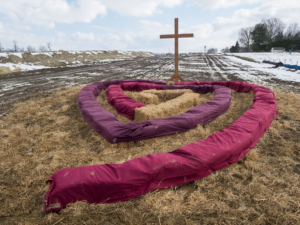
On November 11, 2020, the Adorers of the Blood of Christ, U.S. Region, filed a new pipeline complaint against Transcontinental Gas Pipeline LP (Transco) in U.S. District Court for the Eastern District of Pennsylvania, citing violations of religious freedom.
The Adorers are seeking to recover damages against Transco for its past and continuing violations of the Adorers’ religious beliefs as protected by the Religious Freedom Restoration Act of 1993, a federal law that protects religious liberties.
Transco is a subsidiary of the multi-billion-dollar Williams Company, a natural gas and pipeline company based in Oklahoma. Transco recently constructed and is operating the Atlantic Sunrise Pipeline that is used to facilitate the extraction of natural gas through fracking.
Adorers in Pennsylvania
The Adorers, U.S. Region, are part of an international community of Roman Catholic women founded in Italy in 1834. They came to the United States in 1870 and established their ministry in Lancaster County, Pennsylvania in 1925.
The Adorers have maintained an active ministry there ever since, according to Sister Janet McCann, ASC, who is a member of the U.S. Region’s leadership team. “The Adorers have a deep and longstanding religious belief that it is our obligation to safeguard the sanctity of the Earth,” she said.
Sister McCann pointed to the Adorers’ Land Ethic, adopted in 2005, which says in part, “As Adorers, we honor the sacredness of all creation. . . . As prophets, we reverence Earth as a sanctuary where all life is protected; we strive to establish justice and right relationships so that all creation may thrive.”
Accordingly, the Adorers’ religious practice is for the sisters to protect, preserve, and treasure the land they own and not allow it to be used in a manner that would bring harm to creation.
This is not just a statement of religious beliefs, but it is who the Adorers are, according to Sister McCann. “This vow and commitment to living out our faith requires us to take a public stand when necessary to address actions that violate our Catholic beliefs and teachings.”
New Pipeline Complaint
For these reasons and more, the Adorers have spent the past three years resisting plans by Transco to install its high-volume fracked gas pipeline on their rural property in Lancaster Pennsylvania. The sisters believe it would contribute to climate change and harm the earth, in direct opposition to their religious beliefs.
Despite the Adorers’ steadfast refusal to sign an easement through their land, Williams ignored their religious objections and proceeded with plans to run the pipeline through their land. Transco then condemned the Adorers’ property in order to force the Adorers to use their own land for Transco’s pipeline. The Adorers now seek damages as a result of Transco’s actions.
The new pipeline complaint asserts that Transco is violating the Adorers’ religious rights by constructing and operating its pipeline on the Adorers’ property in violation of their religious beliefs and without their permission. It claims that Transco’s actions in forcing a fossil fuel pipeline on the Adorers’ property “compromises and breaks their religious vows to protect the Earth as God’s creation and violates their call to loving, healthy and life-giving relationships.” They seek a jury trial and damages, including punitive damages, for Transco’s actions.
No Choice But to Challenge
The Adorers believe they have no option but to challenge Transco’s actions. “Transco’s actions in forcing the Adorers to use our own land to facilitate a natural gas pipeline–actions that contribute to global warming and harm Mother Earth—is directly contrary to what we are called to do and to who we are,” Sister McCann said.
The Adorers are represented by attorneys J. Dwight Yoder and Sheila O’Rourke of the law firm of Gibbel Kraybill and Hess.
Dwight Yoder said he is confident that the case will proceed even though Transco’s attorneys have asked for it to be dismissed. He cited a recent U.S. Supreme Court decision that is friendly to religious interests. The court on December 10 ruled unanimously that government officials in their individual capacities could be sued for money damages for violations of the Religious Freedom Restoration Act.